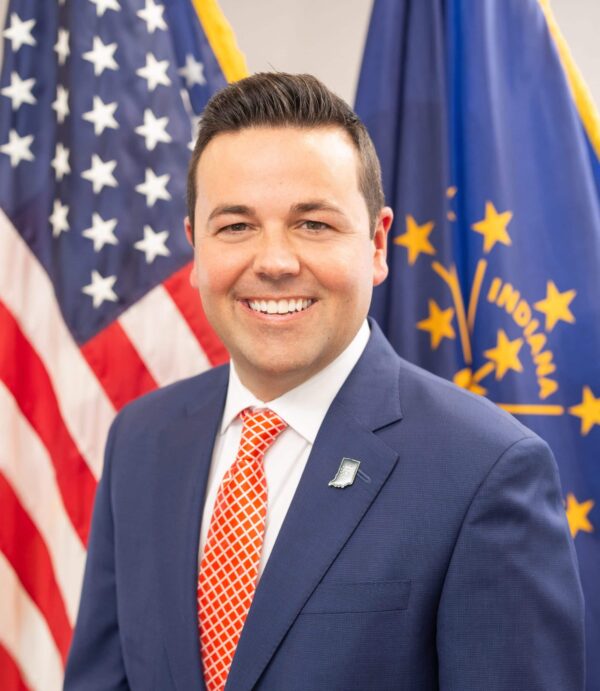
By Sydney Byerly
The Indiana Citizen
August 18, 2025
Indiana school board candidates will be allowed to declare party affiliations on the ballot starting in 2026 — a controversial change that ends decades of officially nonpartisan elections and sets the stage for ideological clashes over education at the local level.
Under the new law, candidates can choose to affiliate with a major political party, run as independents, or remain nonpartisan. Those who select a party will have that affiliation listed on the ballot, while nonpartisan candidates will appear without a label. Importantly, the law does not introduce primaries for school board races.
The first election impacted by this change will be in November 2026, with approximately 800 board seats across the state up for grabs. Because Indiana school boards have staggered terms, only some seats will be up for election in any given cycle.
While legislation led to contentious debate throughout the session, only time will tell how the new law will play out on the schoolyard.
Supporters of the bill argue that partisanship already exists unofficially in many school board races, and that it’s better to make those affiliations clear to the public.
State Sen. Gary Byrne, R-Byrneville, who authored the bill, argued school boards are already political, saying, “These school boards control millions of dollars in property taxes … that alone makes them political.”
He added, “I believe school boards are already partisan, but hidden under the radar.”
Rep. J.D. Prescott, R-Union City, the House sponsor, said party labels would help voters choose candidates who “best align with their values” and could improve turnout.
Lt. Gov. Micah Beckwith also backed the bill when he testified in front of the House Elections committee, calling party labels essential for transparency.

“We’re lying to ourselves if we don’t really come to grips with the politics that are already there,” Beckwith said.
Supporters also argue the change reflects existing realities and will only aid voter decision-making.
Carlin Yoder, a former state senator who represents the conservative-aligned Foundation for Government Accountability, testified in support of the bill during a committee hearing, arguing the change could help with voter turnout, saying “Voters have no idea who they’re voting for or the ideology of these members, so they just choose not to vote.”
Cindi Hajicek, executive director of Purple for Parents United, voiced strong support for Indiana’s new law making school board races partisan, calling it “a step in the right direction” toward greater transparency in local education elections.
The new law, which went into effect in July, allows school board candidates to list a political party affiliation or remain unaffiliated. While this flexibility was viewed by some as a compromise, Purple for Parents had initially favored stricter requirements, pushing for mandatory party declarations to give voters a clearer understanding of each candidate’s political leanings.
“Why wouldn’t you tell us exactly where you stand?” Hajicek asked. “You’re running to serve your community—your community needs to know who you are and what you believe in.” She added that while the final law includes the option for candidates not to declare a party, that decision could hurt them at the ballot box. “By not declaring an affiliation in most races, that’s seen as a negative.”
Hajicek said transparency is crucial for voter awareness, especially in lower-profile races like school boards where incumbents often enjoy strong advantages. In areas like Elkhart County, they noted, party identification could help under-informed voters better evaluate candidates.
However, she also acknowledged a potential loophole: Indiana’s open primary system allows individuals to vote in any party’s primary regardless of past affiliations. This system, they argued, enables candidates to switch party labels for strategic reasons, potentially undermining the transparency the bill seeks to establish.
“Those open primaries are a negative,” she said. “Until we close the primaries, we’re just going to have more of the same dynamic — we’ll see at the local school board level what we already see at the Statehouse.”
Looking at the potential impact on school board governance, Hajicek said partisan identification might shake up voter behavior in the short term, especially in conservative areas where candidates can no longer quietly run under the radar.
“If a candidate someone has voted for two or three times suddenly identifies as a Democrat, that’s going to jolt some people,” she said.
However, she cautioned that long-term effects might be limited unless party-switching loopholes are closed.
As for whether partisan labels will lead to significant changes once candidates are elected, Hajicek was skeptical.
“I’m not overly optimistic that it’s going to be this massive transformation,” she said. “There are a lot of pressures once people get into office. They go through training, they’re told what they can and can’t do — and a lot of times, they buckle.”
Still, she called the legislation “an opportunity for improvement” and reiterated that, while not perfect, it was a meaningful first step toward restoring local accountability and encouraging informed civic participation.
Opponents argue the new law brings unnecessary partisanship to school board elections, potentially discouraging qualified candidates and amplifying the influence of money and ideology.
“This is going to make running for school board a much more expensive and politicized affair,” said Julia Vaughn, the policy director for Common Cause Indiana, warning it could drive away public servants and elevate culture war issues over educational priorities.
Terry Spradlin, executive director of the Indiana School Boards Association, echoed concerns about partisanship shifting school boards away from collaboration.

“We’ve always trained board members to leave politics at the door,” he said, adding that rising campaign costs could turn candidates into “professional fundraisers or politicians.”
School board elections, once quiet and inexpensive, are seeing a sharp rise in campaign spending as political interest and ideological debates intensify. In Indianapolis Public Schools, fundraising for board races has surged dramatically — from just over $200,000 across 10 candidates in 2012 to nearly $600,000 in 2020 for the same number of candidates, according to Chalkbeat. These elected officials hold significant power, overseeing district budgets, setting strategic goals, and shaping key education policies.
The trend extends beyond Indianapolis. In Carmel, school board race contributions nearly doubled in just two years — from $88,000 in 2022 to nearly $155,000 in 2024, despite fewer candidates and seats, according to Current Publishing. The rising financial stakes reflect growing public interest in school board elections and the broader role these boards play in shaping education policy. As spending increases, some observers note that it could change the nature of who runs for office and how campaigns are conducted, potentially influencing the accessibility and dynamics of local races.
Spradlin and Vaughn pointed to a shift in the legislature — particularly the arrival of new lawmakers in 2024 — as key to the bill’s passage. “There were just enough new faces … it didn’t take much to tip the scales,” Spradlin said. He noted that some districts, like Hamilton and Hendricks counties, had already seen rising partisanship in school board races.
That politicization was especially clear in Carmel, where GOP-backed candidates received endorsements from Attorney General Todd Rokita, U.S. Sens. Todd Young and Mike Braun, and Lt. Gov. Micah Beckwith. The Hamilton County GOP also distributed campaign mailers. Vaughn cited Beckwith as a major force behind the bill, pointing to his frequent public advocacy and 15 social media posts on the topic during the legislative session.
Beckwith did testify in favor of the bill in front of a House committee in February. And over the course of the 5-month long legislative session, Lt. Governor Micah Beckwith, who is known for being active on social media, tweeted about this legislation and school boards 15 times. To put this into perspective, the only other topic addressed during the session that he posted more frequently about was property taxes.
In Indiana, school boards serve as the governing bodies for the state’s 290 school districts. Most boards are elected, with a small number appointed by local officials.
Boards’ core responsibilities are hiring and evaluating the superintendent, overseeing the district’s policy manual, approving and monitoring the budget and maintaining the district’s vision, mission, and strategic goals, particularly around student achievement.
School boards operate under significant legislative oversight, with new state laws affecting their duties each year. Over the last eight years, 308 new laws related to K–12 education have been enacted—an average of 38 per year, with 43 passed in the most recent session.
On curriculum, boards do not set academic standards — that role belongs to the Indiana Department of Education and State Board of Education. Instead, local districts design curricula aligned to these standards, often through curriculum directors and teacher committees. Boards have final approval authority, including over sensitive topics like sex education.
“School board members don’t have expertise or content knowledge—they’re not teachers, they’re not licensed educators—so [ISBA] advises boards to rely on their administrative teams,” Spradlin said.
The 2026 election will be the first real test of how the law affects candidate behavior, campaign dynamics and school board governance across Indiana.
It’s important to note that Indiana is nowhere near the first state to pass legislation pushing for partisan school board elections — there are nine other states where the option of displaying party labels is available.
A recent study examining the impact of North Carolina’s shift to more partisan school board elections in 2023 found that switching from nonpartisan to partisan elections significantly alters both political representation and education policy.
The research shows that partisan elections reduce the likelihood of Democratic — and often non-white — candidates winning seats, while increasing the success rate of Republican candidates. This shift in political power also brings measurable policy changes.
“Some communities may not see much change at all,” Spradlin said. “But in politically divided counties, this could reshape how school boards operate.”
Vaughn added that the law could backfire in unexpected ways.
“Republicans may think this law gives them an advantage statewide,” she said, “but that’s not a guarantee. Voters may not respond well to partisan labels in local races. This could be a real ‘be careful what you wish for’ moment.”
Both Vaughn and Spradlin said they don’t expect additional legislation — such as adding school board races to straight-party ballots — until at least after the 2026 election.
“We need to see how this plays out before rushing into more changes,” Spradlin said. “One election cycle probably won’t tell the whole story. We’ll need a couple rounds to understand the long-term consequences.”
Sydney Byerly is a political reporter who grew up in New Albany, Indiana. Before joining The Citizen, Sydney reported news for TheStatehouseFile.com and most recently managed and edited The Corydon Democrat & Clarion News in southern Indiana. She earned her bachelor’s in journalism at Franklin College’s Pulliam School of Journalism (‘Sco Griz!).
The Indiana Citizen is a nonpartisan, nonprofit platform dedicated to increasing the number of informed and engaged Hoosier citizens. We are operated by the Indiana Citizen Education Foundation, Inc., a 501(c)(3) public charity. For questions about the story, contact Marilyn Odendahl at marilyn.odendahl@indianacitizen.org.